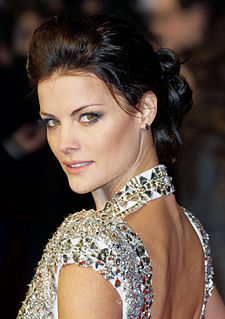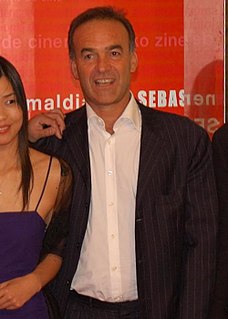A Quote by Jaimie Alexander
I'll say this, I'm no stranger to working with a foreign cast, foreign directors, that sort of thing. I love it, because I think that when you have people from different countries, it sort of brings everyone together, it's more of a worldly film.
Related Quotes
I think, because of my background, which is slightly more exotic than the average British actor, I think, I sort of occupied this little niche quite early on of playing the foreign guy. It started way back at drama school, I played an Eastern European heavy, I played the Russian mobster. And I have done all those different ethnic roles, and I think it's partly because of my look, I think I've got an adaptable sort of nondescript ethnicity, which you can't quite pin down, but it's enough to kind of get a flavor of something.
Everyone is used to speaking a slightly different "language" with their parents than with their peers, because spoken language changes every generation - like they say, the past is a foreign country - but I think this is intensified for children whose parents also grew up in a geographically foreign country.
The more foreign to me, to my existence, to your core existence, the more foreign the foreign language, it's really moving to me to think, to get to experience my own story crossing those boundaries. To have that experience that I so cherished as a reader. I can't believe this. To me, it's really nice because that would be a thing where I'm like, "There may be lots of Jews in my work. I'm not writing stories for Jews. I'm telling stories about people, and Jews are people, too."
LGBT people are really convenient: we're sort of the ultimate foreign agent in Russia. There's no doubt in anyone's mind that the values that affirm nontraditional relationships, that affirm feminism, come from abroad. If you've established - and this isn't up for discussion - that foreign agents are bad, and foreign influence is bad, and the West is our enemy, then there's no better expression of the West's influence than gays and lesbians.
Foreign policy always has more force and punch when the nation speaks with one voice. To remain secure, prosperous, and free, the United States must continue to lead. That leadership requires a president and Congress working together to fashion a foreign policy with broad, bipartisan support. A foreign policy of unity is essential if the United States is to promote its values and interests effectively and help to build a safer, freer, and more prosperous world.
But it's been funny to try and carry the through line, but I think the main thing is the relationship that the band has because we have spent now all this time together that I think that's sort of what we returning to. And whenever we get to play together, it still sort of returns to that little shitty rehearsal space. So that's good.
I think part of the reason I'm attracted to Foster is because he's such a mess. I mean, the people I have loved in my life have never been easy to love. I'm not used to normal. I'm used to disaster. I don't know, as messed up as he is, he's also sort of exciting, sort of a challenge. I'm accustomed to working for love.
You know so many documentaries now are very carefully scripted before you start, and then people are sort of put in chairs which are beautifully lit, and they tell their stories and you do that with another 10 people and you then construct a story from what they say. You do a sort of paper thing, and then you put some images in-between, and that's your film. And that's so not what I think is a good documentary. It can be so much more than that, it should be much more of an adventure and much more uncertain... like real things are.




































